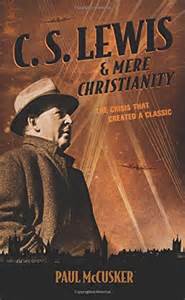I’ve been teaching my C. S. Lewis course at Southeastern University since August. I’m delighted that my students, by their own testimonies, have found it to be so valuable. For some of them, this is the first time they have truly had direct contact with Lewis and his writings, rather than just seeing a couple of Narnia movies.
 They got a lot out of reading his autobiography, Surprised By Joy, and The Screwtape Letters. In between those two reading assignments, I gave them significant portions of Mere Christianity, but I was able to enhance that experience by simultaneously having them read a fairly new book by Paul McCusker called C. S. Lewis and Mere Christianity: The Crisis That Created a Classic.
They got a lot out of reading his autobiography, Surprised By Joy, and The Screwtape Letters. In between those two reading assignments, I gave them significant portions of Mere Christianity, but I was able to enhance that experience by simultaneously having them read a fairly new book by Paul McCusker called C. S. Lewis and Mere Christianity: The Crisis That Created a Classic.
McCusker works with Focus on the Family and is the man who scripted all seven of the Narnia books and Screwtape for Focus’s Family Radio Theatre. In addition, he compiled the exhaustive notes for The Screwtape Letters: The Annotated Edition, a book that I didn’t know existed, and which I must purchase very soon.
I wondered how the students would like this book. Would they consider it too much while working their way through Mere Christianity as well? I need not have worried. McCusker performs a valuable service with this in-depth accounting of how Lewis’s BBC broadcast talks developed and then how they were brought together into his classic volume that continues to make a profound impact on many.
What McCusker accomplishes is perfect for my course, which is history-based as we read Lewis. His book is not simply a narrow focus on the BBC talks, but instead a sweeping historical background for the environment in which those talks took place. He switches back and forth effectively between the larger historical picture of England at war and the personal history of Lewis and all the decisions that went into figuring out what he should say in these talks and how they were received by the public.
What I enjoyed most about the book besides the historical grounding—and many of my students commented on this also—were the excellent inserts into the main text that allow the reader to get more information on a variety of individuals and other topics relevant to the history.
For instance, chapter one gives the reader sidebars on prime minister Neville Chamberlain, the Anderson shelters the government provided to use as bomb shelters during the war, and information on Rev. James Welch, director of religious broadcasting for the BBC. Another chapter offers a biographical overview of Eric Fenn, the man who worked closely with Lewis on the topics and structure of the talks.
We even get insight into Lewis’s gardener, Fred Paxford, a recipe for siege cakes, an analysis of the superiority of German airplanes at that time, the reason for the unique architecture of the BBC building, a typical weekday broadcast schedule for the BBC, and English trains during wartime (and all the hassles associated with rail travel).
Those are just a few samples.
What delights me most is that this book was a significant aid as I attempted to explain British history of this era via my PowerPoint presentations. It came alongside as a great complement and helped accomplish one of my chief goals for the course.
For those of you who would like a companion book for Mere Christianity, I highly recommend McCusker’s helpful and meticulously researched volume. Your knowledge of Lewis and his times will be enhanced through it.
